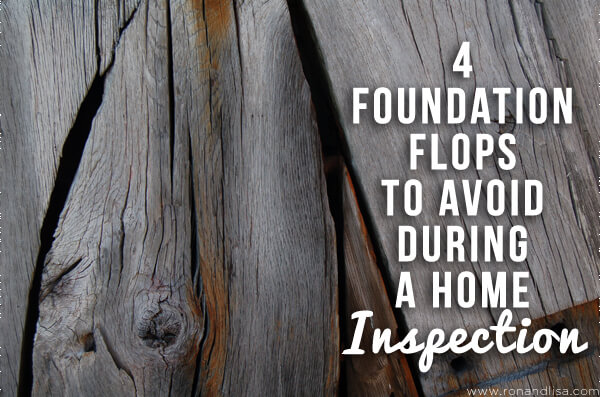Are you getting ready to sell or buy a home? The inspection process can be a little nerve-wracking. Depending on what the inspector finds, you may need to make some unexpected repairs.
The foundation of a home is often a source of surprises, simply because it is “out of sight, out of mind.” To help you prepare for a home inspection, here are some of the more common foundation problems that are uncovered during the process.
1. Signs of an Uneven or Cracked Foundation
Perhaps the most common foundation problem found in home inspections is a cracked or uneven foundation. Cracks can happen over time as the ground underneath the home settles. Concrete is not a pliable material, and without even support, it will crack.
You may not notice such cracks, but a home inspector should be able to spot problem areas in slabs, crawl spaces or basements. Sloping floors, doors that don’t latch, windows that are difficult to open and hairline cracks in the drywall are all signs of an uneven foundation.
Once a foundation has become severely affected by shifting subsoil, it’s best to let the pros repair it, but minor cracks can be handled by most homeowners. Refer to foundation repair information resources to help you decide the best course of action.
2. Leaks in the Basement
Basements sometimes experience minor leaks or major floods, and the cause is not necessarily shoddy construction. Water in the soil surrounding the basement is actually under a significant amount of pressure and will settle in the areas of least resistance. This might mean it travels through (or causes) cracks in the concrete, porous areas in the concrete, or joints that exist in the mortar. In some instances, water can spill into the basement from window wells too.
Basement waterproofing professionals should be able to mitigate leaks once they are identified in the home inspection, which will help the basement remain a comfortable living space or a useful storage area.
3. Wet Soil Found Around Foundation
Wet soil around the foundation is a sign of poor drainage around the home. While no signs of damage may be immediately apparent, it doesn’t take long for mold or mildew to set in. These fungi can be detrimental to your health if they spread into the walls and under the floorboard of your home. The best way to avoid a mold or mildew problem is to create an environment ill-suited for their growth. In short: everything should be dry and moisture-free, especially your home’s foundation!
The soil around the home can be graded to have a proper slope, which will allow water to flow away from the foundation instead of pooling around it. Gutters and downspouts should also be in good working order.
4. Radon
Radon is a tasteless, odorless and invisible gas that is very dangerous. Radon is the second leading cause of lung cancer, just behind smoking cigarettes. Radon is naturally present in the soil and is more common in some areas of the U.S. than others. This gas can enter your home through cracks in the foundation or in any gaps in the framework, especially where the structure makes contact with soil.
The only way to be sure of your exposure to radon is to specifically test for it. When buying a home, be sure to ask about radon testing. If the radon levels are high, you can request the seller have a radon mitigation system installed in the home before signing the contract.
In fact, the responsibility for making repairs in any of the above circumstances usually falls on the seller, unless the buyer is willing to accept the home as-is. Addressing as many problems as possible before the home hits the market can help the sale process run smoothly and quickly.
We hope you enjoy these recommendations and use them for a hassle-free home buying or selling process. Got a favorite tip? Please let us know in the comments below.
Guest blogger, Cathy Habas, is a freelance writer based in Louisville, KY. She is a content developer for Dirtwirx.com, writing pieces of interest for both construction crews and homeowners alike.




I’m planning to purchase a house and lot, that’s why I would like its foundation to be inspected before I make the purchase. I’ll make sure to be mindful of the simple cracks and uneven foundation. I guess I better start looking for a foundation investigation service, so an expert can guide me thoroughly regarding the potential damages.
This is a useful read for homeowners and buyers looking to ensure a solid foundation before closing on a property.